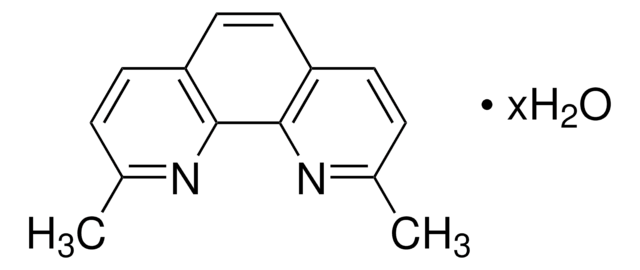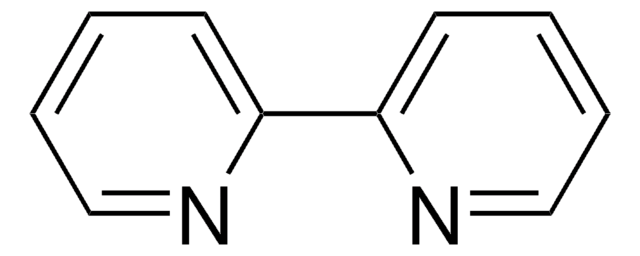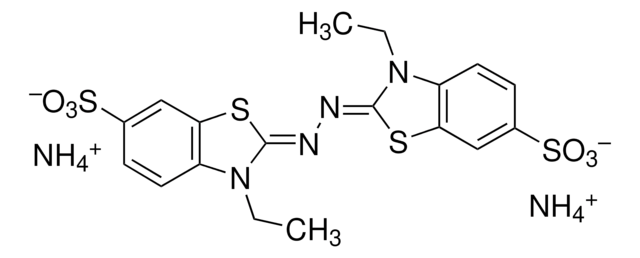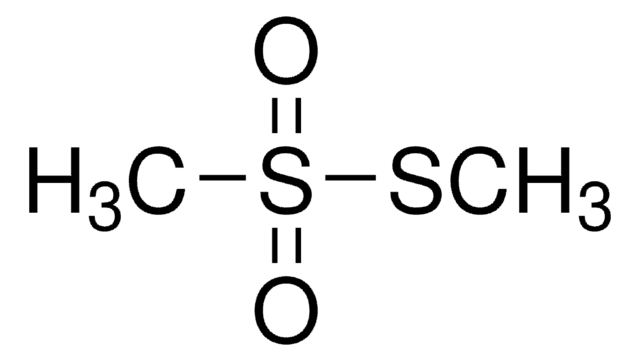N1501
Neocuproin
≥98%
Synonym(e):
2,9-Dimethyl-1,10-phenanthrolin, DMPHEN
Anmeldenzur Ansicht organisationsspezifischer und vertraglich vereinbarter Preise
Alle Fotos(1)
About This Item
Empirische Formel (Hill-System):
C14H12N2
CAS-Nummer:
Molekulargewicht:
208.26
EG-Nummer:
MDL-Nummer:
UNSPSC-Code:
12352100
PubChem Substanz-ID:
NACRES:
NA.22
Empfohlene Produkte
Qualitätsniveau
Assay
≥98%
Form
crystalline
Farbe
white to beige
SMILES String
Cc1ccc2ccc3ccc(C)nc3c2n1
InChI
1S/C14H12N2/c1-9-3-5-11-7-8-12-6-4-10(2)16-14(12)13(11)15-9/h3-8H,1-2H3
InChIKey
IYRGXJIJGHOCFS-UHFFFAOYSA-N
Suchen Sie nach ähnlichen Produkten? Aufrufen Leitfaden zum Produktvergleich
Anwendung
Neocuproin kann als Ligand für Folgendes verwendet werden:
- Bei der aeroben Oxidation von Benzyl mit Allylalkoholen zu den entsprechenden Carbonylverbindungen unter Verwendung von Au(I) als Katalysator.
- Zum Synthetisieren von Aqua(2,9-dimethyl-1,10-phenanthrolin)NiCl2-Komplex. der als Vorläufer für die Herstellung von gleichmäßig sphärischen NiO-Nanopartikeln mittels thermischem Zersetzungsverfahren eingesetzt wird.
- In Zn-katalysierten Allylierungsreaktionen von Aldehyden mit Allylboronaten zum Herstellen von α-Additionsprodukten mit hoher Diastereoselektivität.
Lagerklassenschlüssel
11 - Combustible Solids
WGK
WGK 3
Flammpunkt (°F)
Not applicable
Flammpunkt (°C)
Not applicable
Persönliche Schutzausrüstung
dust mask type N95 (US), Eyeshields, Gloves
Hier finden Sie alle aktuellen Versionen:
Besitzen Sie dieses Produkt bereits?
In der Dokumentenbibliothek finden Sie die Dokumentation zu den Produkten, die Sie kürzlich erworben haben.
Kunden haben sich ebenfalls angesehen
Mustafa Ozyürek et al.
Analytica chimica acta, 616(2), 196-206 (2008-05-17)
Hydroxyl radicals (OH) generated in the human body may play an important role in tissue injury at sites of inflammation in oxidative stress-originated diseases. As a more convenient, efficient, and less costly alternative to HPLC/electrochemical detection techniques and to the
Saliha Esin Celik et al.
Analytica chimica acta, 674(1), 79-88 (2010-07-20)
A novel on-line HPLC-cupric reducing antioxidant capacity (CUPRAC) method was developed for the selective determination of polyphenols (flavonoids, simple phenolic and hydroxycinnamic acids) in complex plant matrices. The method combines chromatographic separation, constituent analysis, and post-column identification of antioxidants in
Yan Wang et al.
Journal of the American Society for Mass Spectrometry, 19(9), 1353-1360 (2008-07-19)
S-nitrosylation of proteins serves an important role in regulating diverse cellular processes including signal transduction, DNA repair, and neurotransmission. Identification of S-nitrosylation sites is crucial for understanding the significance of this post-translational modification (PTM) in modulating the function of a
Mustafa Bener et al.
Analytical chemistry, 82(10), 4252-4258 (2010-04-27)
A low-cost optical sensor using an immobilized chromogenic redox reagent was devised for measuring the total antioxidant level in a liquid sample without requiring sample pretreatment. The reagent, copper(II)-neocuproine (Cu(II)-Nc) complex, was immobilized onto a cation-exchanger film of Nafion, and
Sung-Ho Chen et al.
Toxicological sciences : an official journal of the Society of Toxicology, 102(1), 138-149 (2007-12-07)
Astrocytes play a critical neurotrophic and neuroprotective role in the brain, and improper function of these cells may contribute to the onset of neurodegenerative diseases. Because astrocytes are known to be enriched with Cu chaperone proteins, it is important to
Unser Team von Wissenschaftlern verfügt über Erfahrung in allen Forschungsbereichen einschließlich Life Science, Materialwissenschaften, chemischer Synthese, Chromatographie, Analytik und vielen mehr..
Setzen Sie sich mit dem technischen Dienst in Verbindung.









